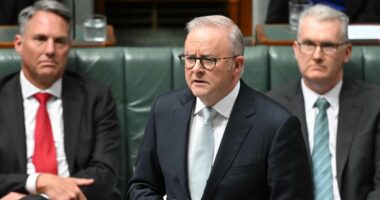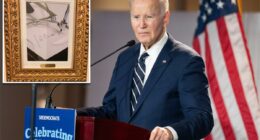Share this @internewscast.com
Keir Starmer is being urged to adopt ‘contribution’ as his new buzz word amid desperate efforts to stabilise Labour.
An influential think-tank has been pushing the PM to adopt the term as a way of countering criticism about the government’s lack of direction.
Chancellor Rachel Reeves is reportedly contemplating using the upcoming Budget to include potential tax hikes, stirring concerns that they might amount to tens of billions of pounds.
However, the proposal for this ‘contribution’ could ignite public dissatisfaction regarding immigration. The paper hints at allowing asylum seekers to work in the UK while awaiting the outcomes of their claims.
Sir Keir has been frequently criticized for altering his stance, initially adopting a Left position to follow Jeremy Corbyn and later retracting several pledges.
The leader has set out an overwhelming number of ‘milestones’ and ‘missions’ for his term, yet even those close to him struggle to discern his core ideology.
In 2020, during an internal party dispute, Sir Keir famously claimed there is no such concept as Starmerism, and it will never exist, amidst accusations of aligning with the Right.
A think-tank named Labour Together, previously directed by Sir Keir’s influential chief-of-staff Morgan McSweeney, has recently endeavored to clarify the administration’s objectives.
Amid dire polls suggesting the PM faces being trounced by Reform at the next election, the report says the party should ‘root itself in an ethic and expectation of contribution: the actions we take that make other people better off’.

Keir Starmer is being urged to adopt ‘contribution’ as his new buzz word amid desperate efforts to stabilise Labour
‘This can be work, care, volunteering, paying taxes or helping out in your community. These acts are the basis of reciprocity and solidarity,’ the paper, written by Chief Policy Adviser Morgan Wild, said.
‘Actions we take for others, in the anticipation that they will take them for us.’
The report warned Labour must ‘meet the public where they are’ and argued that ‘contribution is the main thing they mean by fairness’.
‘They believe that to get something out of the country, you have to put something in. They do not believe the state is doing its part,’ it added.
‘Labour needs to deliver to change their minds. But a politics of contribution would mean much more than delivery. The state would shift focus, towards enabling, rewarding and expecting people to contribute.’
The report urged Sir Keir to ‘stop the pretence that the public will support a welfare system they often see little benefit from themselves’.
It suggested turning Universal Credit into a ‘minimum income guarantee’ while having a social insurance ‘top-up’.
Other ideas include short-term unemployment insurance, better family and care entitlements, and higher contributory pensions.
Mooting a theoretical example of ‘Alice’, a small business owner who is advised to pay herself in dividends and keep money in the business to minimise her tax bill, the report said the tax code should be simplified. Noting that such entrepreneurs fuel the economy, the paper added: ‘Perhaps the most important thing to do is tax them as little as possible.’
The Labour Together proposals also talk about a fictional asylum seeker called Isak, an Eritrean with posttraumatic stress disorder.

The report warned Labour must ‘meet the public where they are’ and argued that ‘contribution is the main thing they mean by fairness’
The report said rather than leaving him in an asylum hotel he should be granted refugee status for six months, and allowed to work.
That would be highly controversial as critics would view it as encouraging more people to cross the Channel in search of a better life.
According to The Times, senior ministers are keen on the ‘contribution’ mantra – although others prefer ‘opportunity’ as a buzz word.
In a foreword to the report, former Cabinet minister Alan Milburn and Matthew Upton, Labour Together’s executive director, said the ‘connection between what people put in and what they get out has all but disappeared’.
They said a ‘paradigm shift’ was needed to avoid Labour becoming irrelevant.

















